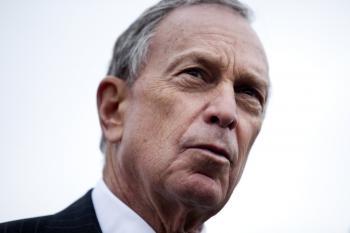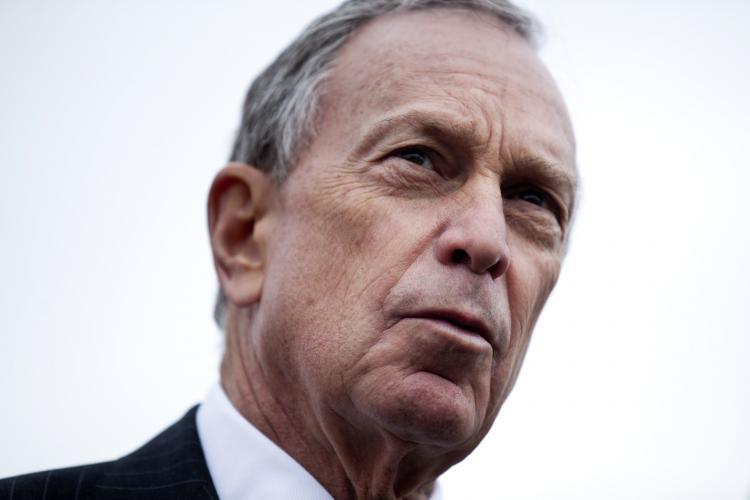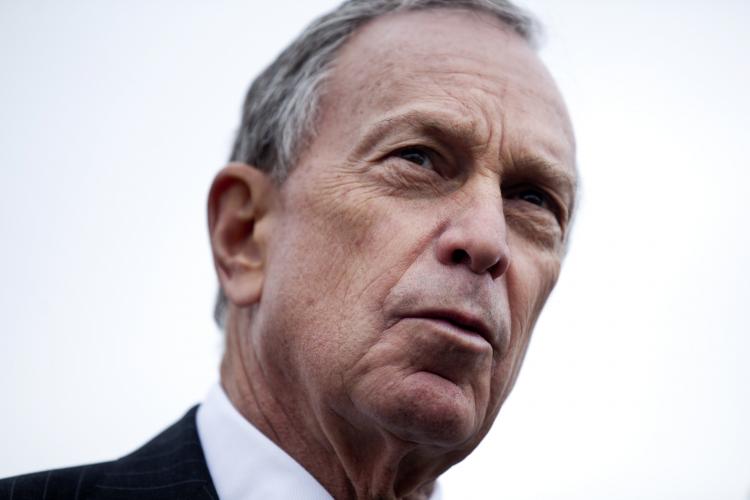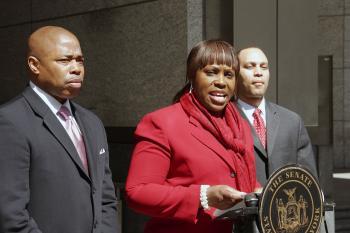NEW YORK—Mayor Michael Bloomberg’s voter approval rating has plummeted for the first time since 2003, according to a recent Quinnipiac University Poll (QUP) released Wednesday.
Survey results showed that 51 percent of city voters disapprove of the way the mayor is doing his job, while 39 percent approve of his job performance.
The most surprising outcome of the poll was “the negative,” said Maurice Carroll, director of the Quinnipiac University Polling Institute. “[For] the first time in eight years, it [the poll] has come up with the negative,” she added.
The majority of Manhattan voters still like the mayor, with 55 percent indicating approval—as opposed to just 35 percent in the Bronx and in Queens, 34 percent in Brooklyn, and 27 percent on Staten Island.
The highest disapproval ratings of the mayor’s job performance came from Staten Island, at 66 percent, and from Kings County in Brooklyn, at 58 percent.
The survey did not ask voters about the reasons for their approval or disapproval.
“My own judgment would be that he [Bloomberg] is part of a historical pattern. The third term tends to be bad news. The third term tends to produce an accumulation of troubles. But, it doesn’t mean the guy is doomed. It doesn’t mean the numbers won’t go right back up again,” Carroll said.
This was the first survey since last year’s Nov. 23 poll, which had indicated a 55-percent job performance approval rating for the mayor.
The city’s response to the post-Christmas blizzard of 2010, in which many city streets were left unplowed for nearly a week, sparked quite a bit of criticism toward the mayor. The incident triggered a City Council investigation.
“Is it the snow? That didn’t look good. Is it that they didn’t know where he was? That didn’t look good,” said Carroll. “If Mayor Bloomberg says, ‘I am doing a tough job and some people don’t like what I am doing,’ he is 100 percent right,” she added.
Only 2 percent bestowed a rating of “excellent” and 26 percent gave a “good” mark in reference to Bloomberg administration’s management of the post-Christmas snow removal. About 70 percent rated the city’s response as either “not so good” or “poor.”
“The mayor is making tough choices in difficult times, which is what people elected him to do,” Stu Loeser, Bloomberg’s press secretary, said in response to queries concerning the findings from the latest QUP survey.
According to poll findings, 72 percent of voters thought that the mayor’s weekend whereabouts are a personal matter, while 84 percent reckoned that he should designate a person in charge and make that known to the public.
The survey also found that 56 percent of voters did not believe that the mayor has no interest in running for U.S. president; nearly three-quarters (74 percent) thought that the mayor would not make a good president.
When asked to pick the main issue confronting New York City today, 37 percent chose the overall economic strain, which included cost of living, housing, and real estate. Approximately 26 percent said that scarce jobs and unemployment were the key economic issues. Education ranked as the second highest concern at 21 percent.
Over two-thirds of voters thought Bloomberg’s involvement in national issues, such as gun control and immigration reforms, are good and beneficial for New Yorkers.
Over 70 percent of voters thought that Bloomberg favors Manhattan over the other boroughs.
Another city official with a statistically significant negative approval rating is Cathleen Black, the new schools chancellor at the Department of Education. Only 17 percent approved of her job performance; 49 percent disapproved, while more than one-third of those surveyed were undecided.
NYPD Commissioner Raymond Kelly received a 67-percent approval rating, with a 57-percent approval among black voters. City Council Speaker Christine Quinn got an approval rating of 55 percent.
The survey, which was conducted from March 8 to March 14 via telephone interviews with 1,115 registered voters, had an error margin of plus or minus 2.9 percent.
The findings from the QUP poll could partially explain why the mayor received mixed reactions and was booed at the Queens and the Staten Island St. Patrick’s parades. The disapproval ratings for the two boroughs were 55 and 66 percent, respectively.
As if he did not have enough problems with New Yorkers, Bloomberg’s jab at Buffalo on Wednesday afternoon at the New York University affordable housing forum made Buffalo Mayor Byron Brown and other leaders see red. Bloomberg had flaunted New York City’s advantages over Buffalo.
State Assemblyman Sam Hoyt stated that the mayor expressed that he had misspoken and meant no disrespect to the city of Buffalo, according to BuffaloNews.com.
Survey results showed that 51 percent of city voters disapprove of the way the mayor is doing his job, while 39 percent approve of his job performance.
The most surprising outcome of the poll was “the negative,” said Maurice Carroll, director of the Quinnipiac University Polling Institute. “[For] the first time in eight years, it [the poll] has come up with the negative,” she added.
The majority of Manhattan voters still like the mayor, with 55 percent indicating approval—as opposed to just 35 percent in the Bronx and in Queens, 34 percent in Brooklyn, and 27 percent on Staten Island.
The highest disapproval ratings of the mayor’s job performance came from Staten Island, at 66 percent, and from Kings County in Brooklyn, at 58 percent.
The survey did not ask voters about the reasons for their approval or disapproval.
“My own judgment would be that he [Bloomberg] is part of a historical pattern. The third term tends to be bad news. The third term tends to produce an accumulation of troubles. But, it doesn’t mean the guy is doomed. It doesn’t mean the numbers won’t go right back up again,” Carroll said.
This was the first survey since last year’s Nov. 23 poll, which had indicated a 55-percent job performance approval rating for the mayor.
The city’s response to the post-Christmas blizzard of 2010, in which many city streets were left unplowed for nearly a week, sparked quite a bit of criticism toward the mayor. The incident triggered a City Council investigation.
“Is it the snow? That didn’t look good. Is it that they didn’t know where he was? That didn’t look good,” said Carroll. “If Mayor Bloomberg says, ‘I am doing a tough job and some people don’t like what I am doing,’ he is 100 percent right,” she added.
Only 2 percent bestowed a rating of “excellent” and 26 percent gave a “good” mark in reference to Bloomberg administration’s management of the post-Christmas snow removal. About 70 percent rated the city’s response as either “not so good” or “poor.”
“The mayor is making tough choices in difficult times, which is what people elected him to do,” Stu Loeser, Bloomberg’s press secretary, said in response to queries concerning the findings from the latest QUP survey.
According to poll findings, 72 percent of voters thought that the mayor’s weekend whereabouts are a personal matter, while 84 percent reckoned that he should designate a person in charge and make that known to the public.
The survey also found that 56 percent of voters did not believe that the mayor has no interest in running for U.S. president; nearly three-quarters (74 percent) thought that the mayor would not make a good president.
When asked to pick the main issue confronting New York City today, 37 percent chose the overall economic strain, which included cost of living, housing, and real estate. Approximately 26 percent said that scarce jobs and unemployment were the key economic issues. Education ranked as the second highest concern at 21 percent.
Over two-thirds of voters thought Bloomberg’s involvement in national issues, such as gun control and immigration reforms, are good and beneficial for New Yorkers.
Over 70 percent of voters thought that Bloomberg favors Manhattan over the other boroughs.
Another city official with a statistically significant negative approval rating is Cathleen Black, the new schools chancellor at the Department of Education. Only 17 percent approved of her job performance; 49 percent disapproved, while more than one-third of those surveyed were undecided.
NYPD Commissioner Raymond Kelly received a 67-percent approval rating, with a 57-percent approval among black voters. City Council Speaker Christine Quinn got an approval rating of 55 percent.
The survey, which was conducted from March 8 to March 14 via telephone interviews with 1,115 registered voters, had an error margin of plus or minus 2.9 percent.
The findings from the QUP poll could partially explain why the mayor received mixed reactions and was booed at the Queens and the Staten Island St. Patrick’s parades. The disapproval ratings for the two boroughs were 55 and 66 percent, respectively.
As if he did not have enough problems with New Yorkers, Bloomberg’s jab at Buffalo on Wednesday afternoon at the New York University affordable housing forum made Buffalo Mayor Byron Brown and other leaders see red. Bloomberg had flaunted New York City’s advantages over Buffalo.
State Assemblyman Sam Hoyt stated that the mayor expressed that he had misspoken and meant no disrespect to the city of Buffalo, according to BuffaloNews.com.






